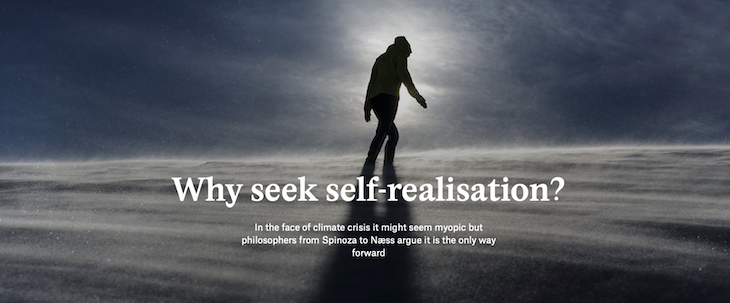Why seek self-realisation?
This is really worth reading. Approach to climate crisis from philosophical stand point. Aleks
\\\\\\\

.
Each of us experiences the climate crisis. We try to adapt to it: buying face masks to brave smoke-filled air outdoors or air purifiers to clean it indoors, turning up the air conditioning to insulate ourselves from excessive heat, preparing to evacuate our homes, if need be, when another hurricane hits the coast. We wonder where we can settle down that won’t go to hell in a handbasket during our lifetime. Some of us wonder whether we should bring children into this world.
The climate crisis prompts questions that challenge our very being. We ask ourselves: ‘Who am I in this increasingly unstable world? What is to become of me?’ Such questions can lead to despair, or lead us to look away, but, as we will see, they can also positively challenge the way we think about ourselves.
Our current political and economic circumstances lead us to think of ourselves as useful cogs in a machine, and of our identity in terms of certain hoops we need to jump through: go to college to get well-paying jobs, climb the property ladder, and make sure we have adequate savings for retirement. However, the climate crisis can prompt us to rethink these suppositions. What good are retirement savings if the world is burning? We need a much richer concept of self – a fully realised self that is worth preserving.
The concept of self-realisation acknowledges our strong drive to preserve ourselves and to persevere in the face of the climate crisis. This self-concept is much richer and more expansive than is commonly recognised. It’s not enough to preserve your narrow, personal self. You are part of a vast, interconnected Universe, where your wellbeing crucially depends on maintaining relationships and connections with others, including nonhuman others.
The Norwegian philosopher Arne Næss (1912-2009) coined the term deep ecology. The main idea of deep ecology is that we should address the ecological crisis through a paradigm shift. Rather than tinkering with concrete targets (such as CO2 emissions), we must radically re-envisage how we engage with the world. Næss was a wide-ranging philosopher with varied interests.

Leave a Reply